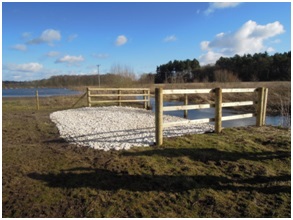Case study:River Meden response to diffuse pollution
Project overview
| Status | Complete |
|---|---|
| Project web site | |
| Themes | Land use management - agriculture, Water quality |
| Country | England |
| Main contact forename | Hannah |
| Main contact surname | Haslock |
| Main contact user ID | User:Jfreeborough |
| Contact organisation | Environment Agency |
| Contact organisation web site | http://www.gov.uk/government/organisations/environment-agency |
| Partner organisations | |
| Parent multi-site project | |
| This is a parent project encompassing the following projects |
No |
Project summary
Improvement works on the River Meden. The work involved installing fencing, cattle drink and pasture pump, to prevent poaching of the river bank. Poaching of river banks leads to run off and erosion, damaging soils and polluting watercourses with an excess of sediment and nutrient. Protected over 250m of the river. Riverbanks will be allowed to recover and water quality improved. Vegetation cover is ideal Water Vole habitat and bird breeding sites.
Monitoring surveys and results
Lessons learnt
Has encouraged pride and ownership by raising awareness, educating and working with the local farmer. By using the site as a demonstration, there are opportunities for wider work to improve areas affected by rural diffuse pollution. Next steps are to promote the success of the project through social media. To support the use of the project site as a demonstration area, for example through farm walks. Support future projects in the area to deliver further outcomes.
Image gallery
|
Catchment and subcatchmentSelect a catchment/subcatchment
Catchment
Subcatchment
Site
Project background
Cost for project phases
Reasons for river restoration
Measures
MonitoringHydromorphological quality elements
Biological quality elements
Physico-chemical quality elements
Any other monitoring, e.g. social, economic
Monitoring documents
Additional documents and videos
Additional links and references
Supplementary InformationEdit Supplementary Information
| ||||||||||||||||||||||||||||||||||||||||||||||||||||||||||||||||||||||||||||||||||||||||||||||||||||||||||||||||||||||||||||||||||||||||||||||||||||||||||||||||||||||||||||||||||||||||||||||||||||||||

